formerly eScholarship Editions


|
|
|
|
Your search for
'Classics' in subject
found 117 book(s). | Modify Search | Displaying 1 - 20 of 117 book(s) | |
| 1. | 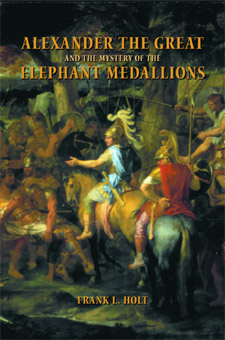 | Title: Alexander the Great and the mystery of the elephant medallions Author: Holt, Frank Lee Published: University of California Press, 2003 Subjects: Classics | Classical History | Ancient History | Military History | Art and Architecture Publisher's Description: To all those who witnessed his extraordinary conquests, from Albania to India, Alexander the Great appeared invincible. How Alexander himself promoted this appearance - how he abetted the belief that he enjoyed divine favor and commanded even the forces of nature against his enemies - is the subject of Frank L. Holt's absorbing book. Solid evidence for the "supernaturalized" Alexander lies in a rare series of medallions that depict the triumphant young king at war against the elephants, archers, and chariots of Rajah Porus of India at the Battle of the Hydaspes River. Recovered from Afghanistan and Iraq in sensational and sometimes perilous circumstances, these ancient artifacts have long animated the modern historical debate about Alexander. Holt's book, the first devoted to the mystery of these ancient medallions, takes us into the history of their discovery and interpretation, into the knowable facts of their manufacture and meaning, and, ultimately, into the king's own psyche and his frightening theology of war. The result is a valuable analysis of Alexander history and myth, a vivid account of numismatics, and a spellbinding look into the age-old mechanics of megalomania. [brief] Similar Items |
| 2. | 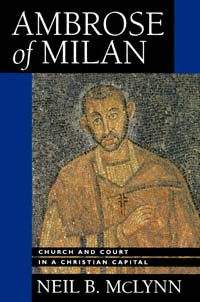 | Title: Ambrose of Milan: church and court in a Christian capital Author: McLynn, Neil 1960- Published: University of California Press, 1994 Subjects: Classics | History | Classical Religions | Christianity | Ancient History | Autobiographies and Biographies Publisher's Description: In this new and illuminating interpretation of Ambrose, bishop of Milan from 374 to 397, Neil McLynn thoroughly sifts the evidence surrounding this very difficult personality. The result is a richly detailed interpretation of Ambrose's actions and writings that penetrates the bishop's painstaking presentation of self. McLynn succeeds in revealing Ambrose's manipulation of events without making him too Machiavellian. Having synthesized the vast complex of scholarship available on the late fourth century, McLynn also presents an impressive study of the politics and history of the Christian church and the Roman Empire in that period.Admirably and logically organized, the book traces the chronology of Ambrose's public activity and reconstructs important events in the fourth century. McLynn's zesty, lucid prose gives the reader a clear understanding of the complexities of Ambrose's life and career and of late Roman government. [brief] Similar Items |
| 3. | 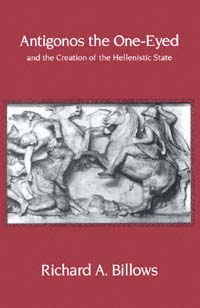 | Title: Antigonos the One-eyed and the creation of the Hellenistic state Author: Billows, Richard A Published: University of California Press, 1997 Subjects: Classics | Ancient History Publisher's Description: Called by Plutarch "the oldest and greatest of Alexander's successors," Antigonos the One-Eyed (382-301 BC) was the dominant figure during the first half of the Diadoch period, ruling most of the Asian territory conquered by the Macedonians during his final twenty years. Billows provides the first detailed study of this great general and administrator, establishing him as a key contributor to the Hellenistic monarchy and state. After a successful career under Philip and Alexander, Antigonos rose to power over the Asian portion of Alexander's conquests. Embittered by the persistent hostility of those who controlled the European and Egyptian parts of the empire, he tried to eliminate these opponents, an ambition which led to his final defeat in 301. In a corrective to the standard explanations of his aims, Billows shows that Antigonos was scarcely influenced by Alexander, seeking to rule West Asia and the Aegean, rather than the whole of Alexander's Empire. [brief] Similar Items |
| 4. | 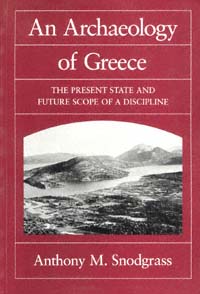 | Title: An archaeology of Greece: the present state and future scope of a discipline Author: Snodgrass, Anthony M Published: University of California Press, 1987 Subjects: Classics | Archaeology | European History Publisher's Description: Classical archaeology probably enjoys a wider appeal than any other branch of classical or archaeological studies. As an intellectual and academic discipline, however, its esteem has not matched its popularity. Here, Anthony Snodgrass argues that classical archaeology has a rare potential in the who . . . [more] Similar Items |
| 5. | 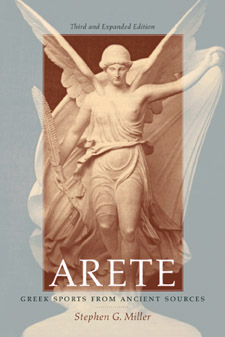 | Title: Arete: Greek sports from ancient sources Author: Miller, Stephen G. (Stephen Gaylord) 1942- Published: University of California Press, 2004 Subjects: Classics | Ancient History | Sports Publisher's Description: From the informal games of Homer's time to the highly organized contests of the Roman world, Miller has compileda trove of ancient sources: Plutarch on boxing, Aristotle on the pentathlon, Philostratos on the buying and selling of victories, Vitruvius on literary competitions, and Xenophon on female body building. With nearly 50 percent more texts than the highly successful second edition, this new version of Arete offers readers an absorbing lesson in the culture of Greek athletics from the greatest of teachers, the ancients themselves, and demonstrates that the concepts of virtue, skill, pride, valor, and nobility embedded in the word arete are only part of the story from antiquity. [brief] Similar Items |
| 6. | 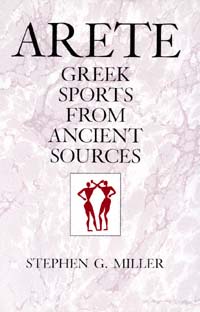 | Title: Arete: Greek sports from ancient sources Author: Miller, Stephen G Published: University of California Press, 1991 Subjects: Classics | Classical Literature and Language | History | Ancient History | Sports Publisher's Description: From the informal games of Homer's time to the highly organized contests of the Roman world, Miller has compiled a trove of ancient sources - Plutarch on boxing, Aristotle on the pentathlon, Philostratos on clay dust as an anti-perspirant and on the buying and selling of victories, Vitruvius on literary competitions, Xenophon on female body building. With fully twice as many texts as the highly successful first edition, this new version of Arete offers readers an absorbing lesson in the culture of Greek athletics from the greatest of teachers - the ancients themselves.These sources, which Miller himself has translated, provide unparalleled insights into ancient athletic practices and competitive festivals. They emphasize the fundamental role of athletics in education and shed light on such issues as the role of women in athletics and the politics and economics of the games. Ultimately they demonstrate that the concepts of virtue, skill, pride, valor, and nobility embedded in the word arete and so closely associated in the modern mind with Greek athletics are only part of the story from antiquity. [brief] Similar Items |
| 7. | 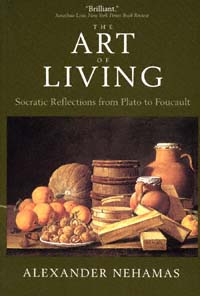 | Title: The art of living: Socratic reflections from Plato to Foucault Author: Nehamas, Alexander 1946- Published: University of California Press, 1998 Subjects: Classics | Classical Philosophy | Classical Literature and Language | Philosophy | Social and Political Thought | Literature Publisher's Description: For much of its history, philosophy was not merely a theoretical discipline but a way of life, an "art of living." This practical aspect of philosophy has been much less dominant in modernity than it was in ancient Greece and Rome, when philosophers of all stripes kept returning to Socrates as a model for living. The idea of philosophy as an art of living has survived in the works of such major modern authors as Montaigne, Nietzsche, and Foucault. Each of these writers has used philosophical discussion as a means of establishing what a person is and how a worthwhile life is to be lived. In this wide-ranging, brilliantly written account, Alexander Nehamas provides an incisive reevaluation of Socrates' place in the Western philosophical tradition and shows the importance of Socrates for Montaigne, Nietzsche, and Foucault.Why does each of these philosophers - each fundamentally concerned with his own originality - return to Socrates as a model? The answer lies in the irony that characterizes the Socrates we know from the Platonic dialogues. Socratic irony creates a mask that prevents a view of what lies behind. How Socrates led the life he did, what enabled or inspired him, is never made evident. No tenets are proposed. Socrates remains a silent and ambiguous character, forcing readers to come to their own conclusions about the art of life. This, Nehamas shows, is what allowed Montaigne, Nietzsche, and Foucault to return to Socrates as a model without thereby compelling them to imitate him.This highly readable, erudite study argues for the importance of the tradition within Western philosophy that is best described as "the art of living" and casts Montaigne, Nietzsche, and Foucault as the three major modern representatives of this tradition. Full of original ideas and challenging associations, this work will offer new ways of thinking about the philosophers Nehamas discusses and about the discipline of philosophy itself. [brief] Similar Items |
| 8. | 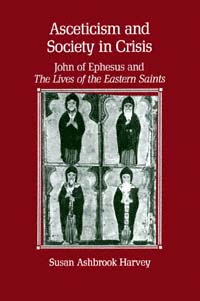 | Title: Asceticism and society in crisis: John of Ephesus and the Lives of the Eastern saints Author: Harvey, Susan Ashbrook Published: University of California Press, 1990 Subjects: Classics | Classical Religions | Classical History Publisher's Description: John of Ephesus traveled throughout the sixth-century Byzantine world in his role as monk, missionary, writer and church leader. In his major work, The Lives of the Eastern Saints , he recorded 58 portraits of monks and nuns he had known, using the literary conventions of hagiography in a strikingly personal way. War, bubonic plague, famine, collective hysteria, and religious persecution were a part of daily life and the background against which asceticism developed an acute meaning for a beleaguered populace. Taking the work of John of Ephesus as her guide, Harvey explores the relationship between asceticism and society in the sixth-century Byzantine East.Concerned above all with the responsibility of the ascetic to lay society, John's writing narrates his experiences in the villages of the Syrian Orient, the deserts of Egypt, and the imperial city of Constantinople. Harvey's work contributes to a new understanding of the social world of the late antique Byzantine East, skillfully examining the character of ascetic practices, the traumatic separation of "Monophysite" churches, the fluctuating roles of women in Syriac Christianity, and the general contribution of hagiography to the study of history. [brief] Similar Items |
| 9. | 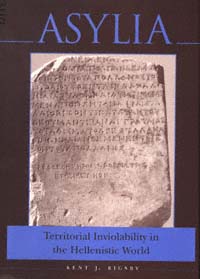 | Title: Asylia: territorial inviolability in the Hellenistic world Author: Rigsby, Kent J 1945- Published: University of California Press, 1997 Subjects: Classics | Ancient History | Politics | Classical History | Classical Religions | Classical Politics Publisher's Description: In the Hellenistic period certain Greek temples and cities came to be declared "sacred and inviolable." Asylia was the practice of declaring religious places precincts of asylum, meaning they were immune to violence and civil authority. The evidence for this phenomenon - mainly inscriptions and coins - is scattered in the published record. The material has never been collected and presented in one publication until now.Kent J. Rigsby lays out these documents and discusses their historical implications in a substantial introduction. He argues that while a hopeful intention of military neutrality lay behind the institution of asylum, the declarations did not in fact change military behavior. Instead, "declared inviolability" became a civic and religious honor for which cities across the Greek world competed during the third to first centuries B.C. [brief] Similar Items |
| 10. | 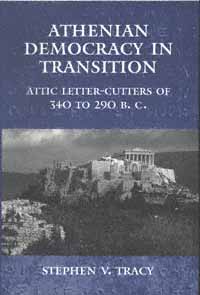 | Title: Athenian democracy in transition: Attic letter-cutters of 340 to 290 B.C Author: Tracy, Stephen V 1941- Published: University of California Press, 1995 Subjects: Classics | Ancient History | Archaeology Publisher's Description: Furthering his masterful new approach to classifying and interpreting epigraphical data presented in Attic Letter-Cutters of 229 to 86 B.C. , Stephen V. Tracy has produced a masterful study of the inscriptions from the time of King Philip of Macedon, Alexander the Great, Demosthenes, and Demetrios. Detailed study of the hands in this largest group of primary documents has enabled him to offer a number of new insights, such as reassessing the career of Demetrios of Phaleron and taking issue with the commonly accepted view that Athenian democracy ended in 322 B.C. with the defeat by the Macedonians at Krannon.Tracy pieces together stone documents and shows that the "handwriting" of individual stonecutters can be identified by the way particular letters are cut into the stone. He offers new readings, redatings, joins and associations, as well as initial publication of some fragments from the excavations in the Athenian agora. [brief] Similar Items |
| 11. | 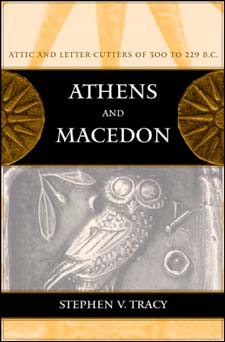 | Title: Athens and Macedon: Attic letter-cutters of 300 to 229 B.C Author: Tracy, Stephen V 1941- Published: University of California Press, 2003 Subjects: Classics | Classical History | Archaeology | Ancient History Publisher's Description: Little of the historiography of third-century Athens survives, and much of what we know - or might know - about the period has come down to us in inscriptions carved by Attic stonemasons of the time. In this book Stephen Tracy, the world's preeminent expert in this area, provides new insight into an . . . [more] Similar Items |
| 12. | 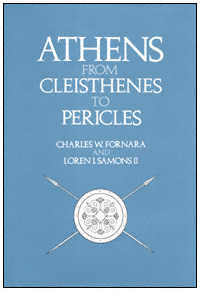 | Title: Athens from Cleisthenes to Pericles Author: Fornara, Charles W Published: University of California Press, 1991 Subjects: Classics | Classical History | Classical Politics Publisher's Description: By the mid fifth century B.C., Athens had become the most powerful city-state in Greece: a rich democracy led by Pericles that boldly gained control of an empire. Athens's strength under Pericles was the result of a complex interaction of events from the time of Cleisthenes. Fornara and Samons unravel the intricacies of the conflicting ancient sources to show how the development of both democracy and empire were interdependent in Athens's multifaceted evolution. The authors trace and contrast four stands of development: the history of the Alcmeonid family of Cleisthenes and Pericles, the nature and development of Athenian democracy, the growth of Athenian empire, and the burgeoning antagonism between Athens and Sparta. The fresh perspective thus afforded by this clear presentation will intrigue those with interests in both ancient economics and politics.The figure of Pericles is central to all four avenues of inquiry. His decision to create the enmisthos polis marked a fateful turn. Henceforth the democracy and the empire presupposed each other. Ultimately, Pericles's policies fueled Sparta's growing insecurity, resulting in her declaration of war on Athens in 431 B.C. and Athens's eventual fall. [brief] Similar Items |
| 13. | 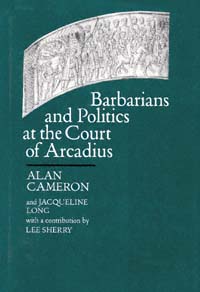 | Title: Barbarians and politics at the Court of Arcadius Author: Cameron, Alan Published: University of California Press, 1993 Subjects: Classics | Religion | Ancient History Publisher's Description: The chaotic events of A.D. 395-400 marked a momentous turning point for the Roman Empire and its relationship to the barbarian peoples under and beyond its command. In this masterly study, Alan Cameron proposes a complete rewriting of received wisdom concerning the social and political history of these years. Our knowledge of the period comes to us in part through Synesius of Cyrene, who recorded his view of events in his De regno and De providentia . By redating these works, Cameron offers a vital, new interpretation of the interactions of pagans and Christians, Goths and Romans.In 394/95, during the last four months of his life, the emperor Theodosius I ruled as sole Augustus over a united Roman empire that had been divided between at least two emperors for most of the preceding one hundred years. Not only did the death of Theodosius set off a struggle between Roman officeholders of the two empires, but it also set off renewed efforts by the barbarian Goths to sieze both territory and office. Theodosius had encouraged high-ranking Goths to enter Roman military service; thus well placed, their efforts would lead to Alaric's sack of Rome in 410. Though Cameron's interest is in the particularities of events, the book conveys a wonderful sense of the general time and place. Cameron's rebuttal of modern scholarship, which pervades the narrative, enhances the reader's engagement with the complexities of interpretation. The result is a sophisticated recounting of a period of crucial change in the Roman Empire's relationship to the non-Roman world. [brief] Similar Items |
| 14. | 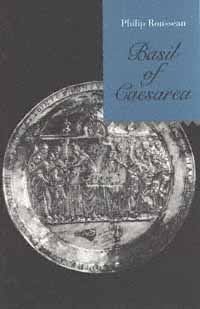 | Title: Basil of Caesarea Author: Rousseau, Philip Published: University of California Press, 1995 Subjects: History | Religion | Classics | Ancient History | Christianity | Classical Religions Publisher's Description: Basil of Caesarea is thought of most often as an opponent of heresy and a pioneer of monastic life in the eastern church. In this new biographical study, however, controversy is no longer seen as the central preoccupation of his life nor are his ascetic initiatives viewed as separable from his pastoral concern for all Christians. Basil's letters, sermons, and theological treatises, together with the testimonies of his relatives and friends, reveal a man beset by doubt. He demanded loyalty, but gave it also, and made it a central feature of his church. In Rousseau's portrait, Basil's understanding of human nature emerges as his major legacy. [brief] Similar Items |
| 15. | 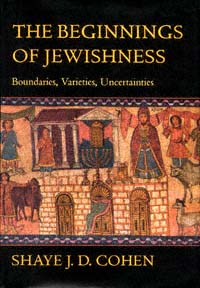 | Title: The beginnings of Jewishness: boundaries, varieties, uncertainties Author: Cohen, Shaye J. D Published: University of California Press, 1999 Subjects: Religion | Judaism | Classical Religions | Classics | Jewish Studies Publisher's Description: In modern times, various Jewish groups have argued whether Jewishness is a function of ethnicity, of nationality, of religion, or of all three. These fundamental conceptions were already in place in antiquity. The peculiar combination of ethnicity, nationality, and religion that would characterize Jewishness through the centuries first took shape in the second century B.C.E. This brilliantly argued, accessible book unravels one of the most complex issues of late antiquity by showing how these elements were understood and applied in the construction of Jewish identity - by Jews, by gentiles, and by the state.Beginning with the intriguing case of Herod the Great's Jewishness, Cohen moves on to discuss what made or did not make Jewish identity during the period, the question of conversion, the prohibition of intermarriage, matrilineal descent, and the place of the convert in the Jewish and non-Jewish worlds. His superb study is unique in that it draws on a wide range of sources: Jewish literature written in Greek, classical sources, and rabbinic texts, both ancient and medieval. It also features a detailed discussion of many of the central rabbinic texts dealing with conversion to Judaism. [brief] Similar Items |
| 16. | 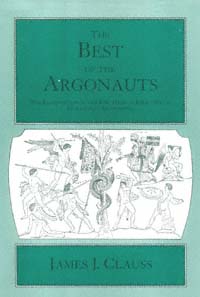 | Title: The best of the Argonauts: the redefinition of the epic hero in book one of Apollonius's Argonautica Author: Clauss, James Joseph Published: University of California Press, 1993 Subjects: Classics | Literature | Classical Literature and Language | Literary Theory and Criticism Publisher's Description: This revelatory exploration of Book One of the Argonautica rescues Jason from his status as the ineffectual hero of Apollonius' epic poem. James J. Clauss argues that by posing the question, "Who is the best of the Argonauts?" Apollonius redefines the epic hero and creates, in Jason, a man more realistic and less awesome than his Homeric predecessors, one who is vulnerable, dependent on the help of others, even morally questionable, yet ultimately successful.In bringing Apollonius' "curious and demanding poem" to life, Clauss illuminates two features of the poet's narrative style: his ubiquitous allusions to the poetry of others, especially Homer, and the carefully balanced structural organization of his episodes. The poet's subtextual interplay is explored, as is his propensity for underscoring the manipulation of the poetry of others through ring composition. [brief] Similar Items |
| 17. | 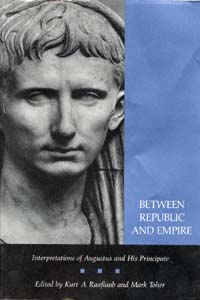 | Title: Between republic and empire: interpretations of Augustus and his principate Author: Raaflaub, Kurt A Published: University of California Press, 1993 Subjects: Classics | Classical History | Ancient History Publisher's Description: Representing five major areas of Augustan scholarship - historiography, poetry, art, religion, and politics - the nineteen contributors to this volume bring us closer to a balanced, up-to-date account of Augustus and his principate. Similar Items |
| 18. | 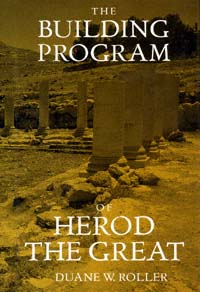 | Title: The building program of Herod the Great Author: Roller, Duane W Published: University of California Press, 1998 Subjects: Classics | Architecture | Ancient History | Archaeology Publisher's Description: Herod the Great, King of Judaea from 444 B.C., is known as one of the world's great villains. This notoriety has overshadowed his actual achievements, particularly his role as a client king of Rome during Augustus's reign as emperor. An essential aspect of Herod's responsibilities as king of Judaea was his role as a builder. Remarkably innovative, he created an astonishing record of architectural achievement, not only in Judaea but also throughout Greece and the Roman east. Duane W. Roller systematically presents and discusses all the building projects known to have been initiated by Herod, and locates this material in a broad historical and cultural context.Bringing together previously inaccessible material, Roller enriches our understanding of the enigmatic Herod and provides new insights into Roman architecture. Herod was instrumental in the diffusion of the Augustan architectural revolution into the provinces and was the first to build outside Italy such Italian architectural forms as the basilica, amphitheater, villa, and Italian temple. Herod's legacy provided a groundwork for the architectural Romanization of the east, influencing the construction of the great temple complexes and palaces so familiar from later Roman architecture.Herod, like Augustus himself, was not only interested in architecture but also in diplomatic and financial contacts among cities of the region. In addition to providing a repertorium of the building projects, this study is also an exploration of international relations in the eastern Mediterranean at the beginning of the Roman imperial period. [brief] Similar Items |
| 19. | 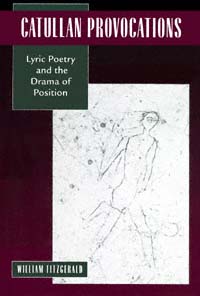 | Title: Catullan provocations: lyric poetry and the drama of position Author: Fitzgerald, William 1952- Published: University of California Press, 1996 Subjects: Classics | Comparative Literature | Classical Literature and Language | Poetry Publisher's Description: Restoring to Catullus a provocative power that familiarity has tended to dim, this book argues that Catullus challenges us to think about the nature of lyric in new ways. Fitzgerald shows how Catullus's poetry reflects the conditions of its own consumption as it explores the terms and possibilities of the poet's license. Reading the poetry in relation to the drama of position played out between poet, poem, and reader, the author produces a fresh interpretation of almost all of Catullus's oeuvre. Running through the book is an analysis of the ideological stakes behind the construction of the author Catullus in twentieth-century scholarship and of the agenda governing the interpreter's position in relation to Catullus. [brief] Similar Items |
| 20. | 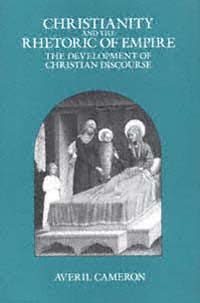 | Title: Christianity and the rhetoric of empire: the development of Christian discourse Author: Cameron, Averil Published: University of California Press, 1991 Subjects: Classics | Classical Religions | Classical History | History | Christianity | Ancient History | Rhetoric Publisher's Description: Many reasons can be given for the rise of Christianity in late antiquity and its flourishing in the medieval world. In asking how Christianity succeeded in becoming the dominant ideology in the unpromising circumstances of the Roman Empire, Averil Cameron turns to the development of Christian discourse over the first to sixth centuries A.D., investigating the discourse's essential characteristics, its effects on existing forms of communication, and its eventual preeminence. Scholars of late antiquity and general readers interested in this crucial historical period will be intrigued by her exploration of these influential changes in modes of communication.The emphasis that Christians placed on language - writing, talking, and preaching - made possible the formation of a powerful and indeed a totalizing discourse, argues the author. Christian discourse was sufficiently flexible to be used as a public and political instrument, yet at the same time to be used to express private feelings and emotion. Embracing the two opposing poles of logic and mystery, it contributed powerfully to the gradual acceptance of Christianity and the faith's transformation from the enthusiasm of a small sect to an institutionalized world religion. [brief] Similar Items |